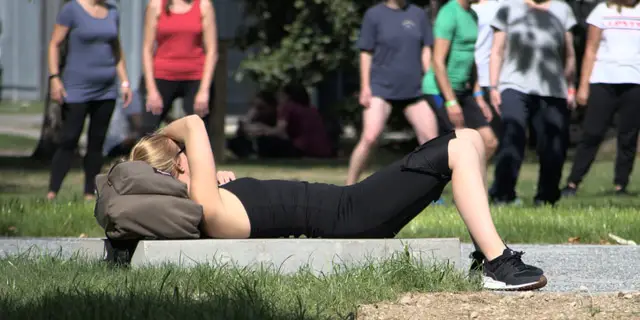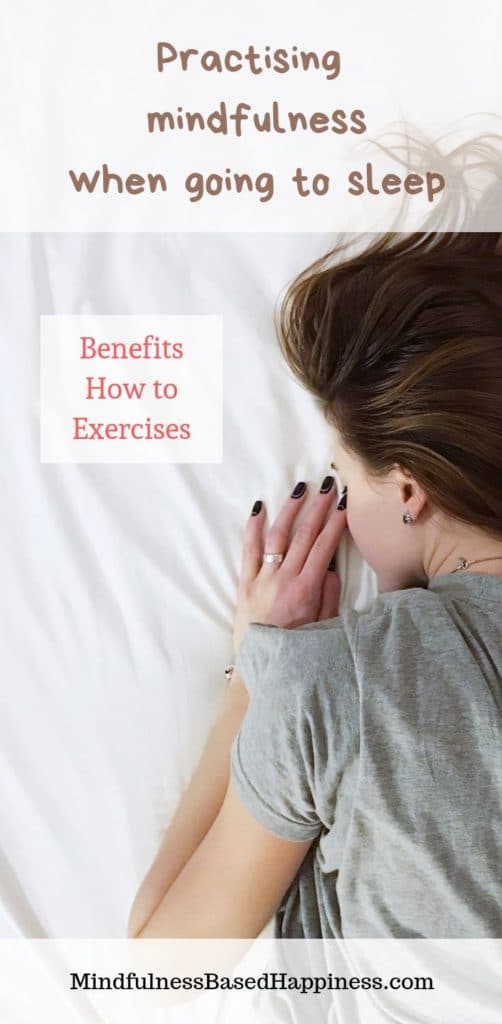The benefits of meditating before going to sleep.
The answer to the 1 million-dollar question, should you be doing meditation before going to sleep, can be answered with an emphatic yes! Not only do you get the regular benefits of meditation, but for those who suffer from insomnia, it has the added benefit that it helps you fall asleep more easily.

We all have the experience of not being able to fall asleep because we are preoccupied with some problem that occurred during the day, or that we will need to tackle the next day. And this problem keeps us awake. And one hour later, we have a new problem that keeps us awake: the fact that we should have been sleeping since an hour and that sleep still does not want to come.
The truth is that you need some form of stability, of focus to be able to fall asleep. If your thoughts are racing, it is no easy feat.
What are the benefits of meditation for your sleep?
Scientific research has associated meditation with a whole list of benefits. It ranges from the reduction of stress over the reduction of anxiety fear via an increased well-being to an improved immune function.
The list of benefits of meditation is far longer and more impressive than I have time for in this article. If you want to, you can read more in my article about loving kindness meditation, for instance.
Let’s have a look at the benefits for your sleep in general.
A review paper from 2012 examined meditation and its regulatory role on sleep. They found a positive correlation between meditation and sleep across a number of markers, including brainwaves, hormone production, cardiovascular system, and oxygen consumption.
But, the benefits of meditation are not limited to the quality of your sleep, and to the fact that you can more easily fall asleep.
Actually, because of the similarities between the brainwave states when you are sleeping and the brainwaves when you are meditating, you will actually need less sleep overall. This article studied long term meditators and found:”In long term meditators, multiple hours spent in meditation are associated with a significant decrease in total sleep time when compared with age and sex matched controls who did not meditate.”

Obviously, when you start out, you will not immediately see a reduction in your sleeping needs. It might even be the inverse. As you start learning a new skill, it can take up some amount of energy. So in the beginning, you might need a bit more sleep, but only for a short duration.
Personal experience: When I go on a retreat, the kind where you do 8 to 10 hours of meditation per day, I tend to be exhausted in the evening. The last meditation, which is very often a metta meditation, tends to feel off. Usually, metta gives a very warm and tender feeling, but after 8 hours of meditation, all the energy seems to have been drained from my body. But by day three, I wake up in the morning with a strong yearning to start meditating again. And by day five, most of the fatigue due to the long hours of meditating are gone. Unfortunately, I cannot say that after or during such a retreat, I need less sleep. Maybe a little, but the difference is too small to be significant.
But why meditate when in bed, right before going to sleep?
I confess, up until this point, I did not talk a lot about the benefits of doing your meditation when lying in bed.
But meditation before going to sleep, when you are already in bed, does have a few added benefits.
Benefit 1: fall asleep more easily
To start with the most important: it can help you fall asleep more easily.
Now, you might argue that you are supposed to stay present and focussed during meditation. That is very true, but meditation also has the tendency to make you more relaxed.
Experience: When I lead a body scan meditation, it is not uncommon for people to fall asleep. I like to believe that this is not due to me being so boring. No, as people typically are very tired, leading them in a mindfulness exercise that is relaxing by nature, tends to make them fall asleep. In the yoga class I take, people fall asleep in the body scan in less than 10 minutes. I always find that very impressive.
Actually, the fact that meditation before going to sleep helps with insomnia, is not only speculation on my side. Luckily, scientific research has been done to confirm this. This article finds that meditation before sleep does not only make you fall asleep faster, it also enhances the quality of your sleep.
So why do you fall asleep more easily while practising meditation?
There can be a whole lot of reasons why you cannot fall asleep. It ranges from too much caffeine to too much television.
But a very important reason people cannot fall asleep is stress. And the associated thoughts and emotions. As said in the introduction, we need some focus and stability to be able to fall asleep. We all have the experience of racing thoughts that cannot be stopped and somehow keep us awake.
The fact of bringing consistently bringing our focus back to a single point, like in a simple breathing meditation, or to acknowledge our thoughts and emotions, like in mindfulness meditation, can be enough to stop the racing thoughts.
We then can start honing in on our natural feeling of being tired, who will gently lead us into sleep.
Personally, I find it a delightful feeling to feel myself become drowsy and then drift of into sleep, only to wake up refreshed the next morning.

Benefit 2: To meditate more
The other great boon of meditating while you are already in bed, is that it is an easy way to build your new habit. Many people have so much to do in their day that adding yet another thing to do simply does not work.
Mindfulness teachers always emphasize that you can do short moments of mindfulness practices on lost moment, like when you are waiting in a queue, or stopped at a traffic light.
Well, going to bed is a perfect example of this. You will anyway have 5-10 minutes before you fall asleep. Why not use them in a very beneficial way and do some meditation?
And if you are one of these people that wake up during the night, as I am, do not worry, that is another great opportunity to practice meditation. I always practice mindfulness meditation when I wake up at night. I consider it extra quality time for myself.
I used to be awake for quite some time when this happened, but now, I fall back asleep far more easily. Which brings me back to advantage number one.
How to practice meditation before going to sleep
I highly recommend three practices when you are already in bed.
Gratitude
The first one is a simple gratitude practice. Gratitude is one of these practices that have also been studied extensively and has a lot of benefits. You can read this article on the Harvard website to learn more if you want.
The practice does not take a lot of time. Just think of five things you are grateful for in your life. Or think about things that happened during the day and that made you smile, or just gave you a little moment of joy.
It can be small things. Like the waitress that was friendly when she served you. Acknowledge this fact and be grateful for it. Linger a moment on the feeling of joy or gratitude, and then move on too the next.
Body Scan meditation
Once you have done this, I would move on to a body scan meditation. This practice will calm you down in no time.
To do a body scan, either go to the detailed instruction, or follow along with the guided meditation hereunder.
The essence of the practice is that you bring your attention to all of your body parts, one by one. When your focus is on a particular point, notice whatever there is to experience about this body part. Is it warm, cold, tense, etc …
But do this without judging. Just notice and acknowledge the fact that is is warm, cold or tense.
Now, due to this exercise, the body has a natural tendency to relax. If this is not the case, gently try to relax whatever tension you feel. If this does not work, do not worry, tomorrow is another day. It sometimes takes time and practice for our bodies to relax. Do not forget that we sometimes have been tensed for a few decades. So give the process of unlearning this tendency it’s time to unfold.
Mindfulness meditation of thoughts and feelings.
If you made it thus far, it mean you did not fall to sleep during the body scan. That is a feat in it’s own right ;-).
It might mean that you indeed have emotions and thoughts that keep you awake.
In that case, move on to the third meditation: mindfulness of thoughts and feelings. This meditation, is similar to the body scan in that you will notice certain events in yourself without judging them.
You will simply bring your attention to your thoughts and emotions and acknowledge that you have them whenever you see them. So if a thought comes up:”I cannot fall asleep”, or “why can’t I be like everybody else and have a good night sleep”, simply acknowledge it and think:”Ah, a thought”. And do not make a fuss about it. Do not start to think that you should not have these thoughts. That is not helpful. And if you do get the thought:”I should not have these thoughts”, acknowledge that one too: “Ah, another thought, interesting”
Conclusion
I hope I convinced you that meditation when you are lying in bed before going to sleep is a wonderful practice. It will help you to fall asleep more easily, have better quality sleep and will allow you to do more meditation without even trying.
I wish you all a good night sleep.

Featured image courtesy of Snapwire.
Hi, I’m Olivier Devroede and I have been meditating seriously since 2009.
Due to the great benefits I have seen in meditating, I decided to become an MBSR trainer myself and start a blog.


